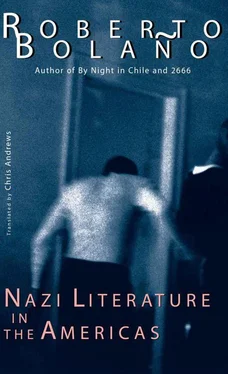He could have continued with Depestre, but Max Mirebalais was no fool; he decided to multiply his sources. With patient craftsmanship, sacrificing hours of sleep, he plagiarized Anthony Phelps and Davertige, and created his first heteronym: Max Kasimir, the cousin of Max Mirebalais, to whom he attributed poems borrowed from those who had ridiculed his first ventures into print: Philoctète, Morisseau and Legagneur, founding members of the Haiti Littéraire group. The poets Lucien Lemoine and Jean Dieudonné Garçon came in for the same treatment.
With the passage of time he became expert in the art of breaking down the work of another poet in order to make it his own. Vanity soon got the better of him and he tried to conquer the world. French poetry provided a boundless hunting ground, but he decided to start closer to home. His plan, noted somewhere in his papers, was to exhaust the expressive repertoire of négritude .
So, after expressing and exhausting more than twenty authors, whose collections, although extremely hard to come by, were placed at his disposal free of charge by the Apollinaire French Bookshop, he decided to let Mirebalais take charge of Georges Desportes and Edouard Glissant from Martinique, while Max Kasimir assumed responsibility for Flavien Ranaivo from Madagascar and Leopold-Sedhar Senghor from Senegal. In plagiarizing Senghor his art reached a summit of perfection: no one realized that the five poems that appeared in the Monitor in the second week of September 1971 signed Max Kasimir were texts that Senghor had published in Hosties noires (Seuil, 1948) and Ethiopiques (Seuil, 1956).
He came to the attention of the powerful. As a society columnist he went on covering the soirées of Port-au-Prince, with greater enthusiasm if anything, and now he was greeted by the hosts and introduced in various ways (much to the confusion of the less literary guests), as our treasured poet Max Mirebalais, or our beloved poet Max Kasimir or, as certain jovial military men used to say, our esteemed bard Kasimir Mirebalais. He did not have to wait long for his reward: he was offered the post of cultural attaché in Bonn, which he accepted. It was the first time he had left the country.
Life abroad turned out to be awful. After an unbroken series of illnesses that kept him hospitalized for more than three months, he decided to create a new heteronym: the half-German, half-Haitian poet Max von Hauptman. This time he copied Fernand Rolland, Pierre Vasseur-Decroix and Julien Dunilac, whom he presumed were little known in Haiti. From the manipulated, made-over, metamorphosed texts rose the figure of a bard who even-handedly explored and sang the magnificence of the Aryan and the Masai races. After three rejections, the poems were accepted by a Parisian publisher. Von Hauptman was an immediate success. So while Mirebalais spent his days enduring the boredom of his work at the embassy or undergoing endless medical tests, he was coming to be known, in certain Parisian literary circles, as the Caribbean’s bizarre answer to Pessoa. Naturally no one (not even the poets who had been plagiarized, some of whom could well have come across the curious texts of von Hauptman) noticed the fraud.
Mirebalais, it seems, was excited by the idea of being a Nazi poet while continuing to espouse a certain kind of négritude . He decided to pursue von Hauptman’s creative work in greater depth. He began by clarifying — or obscuring — his origins. Von Hauptman was not one of Mirebalais’ heteronyms. Mirebalais was a heteronym of von Hauptman, whose father, so he said, had been a sergeant in Doenitz’s submarine fleet, cast up on the Haitian coast, a Robinson stranded in a hostile land, protected by a few Masai who sensed that he was their friend. He married the prettiest of the Masai girls, and Max was born in 1944 (which was a lie: he was born in 1941, but fame had gone to his head, and since he was enhancing the truth, he thought he might as well take three years off his age). Predictably, the French did not believe him, but neither did they take exception to his outlandish claims. All poets invent their past, as the French know better than anyone. In Haiti, however, reactions were diverse. Some saw Mirebalais as a pathetic fool. Others promptly invented European fathers or grandfathers of their own: shipwrecked seamen from German, English or French vessels, adventurers gone astray in some corner of the island. Overnight, the Mirebalais-von Hauptman phenomenon spread like a virus through the island’s ruling class. Von Hauptman’s poems were published in Port-au-Prince, affirmations of Masai identity ran riot (in a country where Masai ancestry is so rare as to be probably non-existent) accompanied by legends and family histories. A pair of adepts of the New Protestant Church even tried their hand at plagiarizing the plagiarist, without much success.
Fame, however, is quick to perish in the tropics. By the time he returned from Europe, the von Hauptman craze had been forgotten. Those who wielded real power — the Duvalier dynasty, the few wealthy families and the army — had little time for the preoccupations of an idealized, bogus half-breed. Dazzled by the Haitian sun, Mirebalais was sad to discover that order and the struggle against Communism carried more weight than the Aryan race, the Masai race and their common destiny in the universal realm. But quite undeterred, he prepared himself to unleash another heteronym upon the world, in a gesture of defiance. And so Max Le Gueule was born: the crowning glory of the plagiarist’s art, a concoction of poets from Quebec, Tunisia, Algeria, Morocco, Lebanon, Cameroon, The Congo, the Central African Republic and Nigeria (not to mention the Malian poet Siriman Cissoko and the Guinean Keita Fodeba, to whose works, kindly lent by the old manic-depressive owner of the Apollinaire French Bookshop, Mirebalais initially reacted with howls and later with trembling).
The result was excellent; the reception non-existent.
This time Mirebalais’ pride was wounded; for some years he withdrew to the dwindling, spectral Society section of the Monitor , and was obliged to supplement his income by taking up an obscure position in the Haitian Telephone Company.
The years of relegation were also years of poetic labor. The works of Mirebalais multiplied, as did those of Kasimir, von Hauptman and Le Gueule. The poets gained in depth; the differences between them became more clearly marked (von Hauptman the bard of the Aryan race, a fanatical mulatto Nazi; Le Gueule the model of the practical man, hard-headed and militaristic; Mirebalais the lyrical poet, the patriot, calling forth the shades of Toussaint L’Ouverture, Dessalines and Christophe, while Kasimir celebrated négritude , the landscapes of the fatherland and mother Africa, and the rhythm of the tam-tams). The similarities emerged more clearly too: they were all passionately devoted to Haiti, order and the family. In religious matters there was some disagreement: while Mirebalais and Le Gueule were Catholic and reasonably tolerant, Kasimir practised voodoo rites, and the vaguely Protestant von Hauptman was definitely intolerant. Clashes among the heteronyms were organized (especially between von Hauptman and Le Gueule, who were always spoiling for a fight), followed by reconciliations. They interviewed one another. The Monitor published some of the interviews. It is not absurd to suppose that one night, in a moment of inspiration and ambition, Mirebalais dreamed of constituting the whole of contemporary Haitian poetry on his own.
Feeling that he had been pigeonholed as picturesque (and this in a context where all the literature officially sanctioned by the Haitian regime was picturesque to say the least), Mirebalais made one last bid for fame or respectability.
Читать дальше












